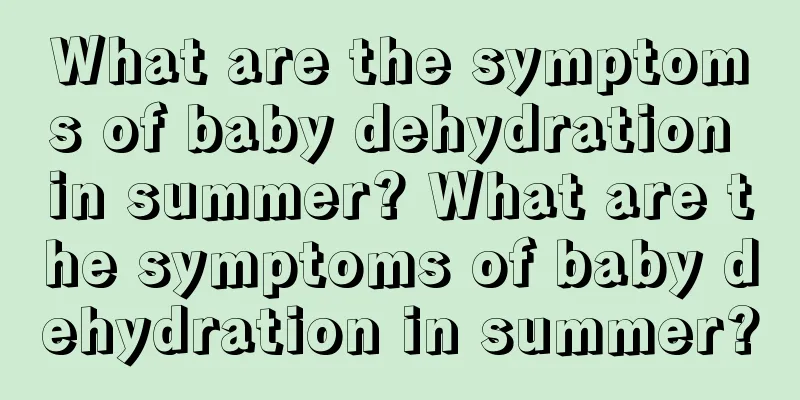What are the symptoms of baby dehydration in summer? What are the symptoms of baby dehydration in summer?

|
What are the symptoms of baby dehydration in summer? In summer, due to the hot weather, babies are very easy to dehydrate. Today, I will introduce to you the symptoms of baby dehydration in summer. Once the baby shows symptoms of dehydration, parents should take care of it in time, otherwise it is easy to cause damage to the baby's body. What are the symptoms of baby dehydration in summerWeight loss: Mild: 3%-5%, Moderate: 6%-10%, Severe: greater than 10%. Lips: Mild: Dry, Moderate: Dry, Severe: Dry. Inside the mouth: Mild: moist, moist, Moderate: but little saliva, Severe: dry. Tears: Mild: Yes, Moderate: Yes, Severe: No. Anterior fontanelle: mild: flat and soft, moderate: soft, slightly sunken, severe: sunken. Skin: Mild: good elasticity, Moderate: good elasticity, Severe: does not recover easily after pinching. Urinary frequency: Mild: normal, Moderate: reduced, but can be maintained more than 3 times per 24 hours, Severe: less than 3 times per 24 hours. If your child is mildly dehydrated, you can use oral rehydration salts to correct the dehydration. But if you suspect your child is moderate to severe dehydration, you must go to the hospital to see a doctor immediately. Reasons for baby dehydration in summerReasons why babies become dehydrated include: Overheating: In the hot summer, if your baby is too active or just stays in a poorly ventilated, hot room, your baby will sweat and lose water. To prevent your baby from becoming dehydrated in hot weather, give your baby more fluids than usual. This can prevent your baby from becoming dehydrated. The way to check if your baby is getting enough water is to see if his urine is clear. Fever: Babies with fever will lose a lot of body fluids, so as long as the baby has a fever, he should be given plenty of fluids. This can be milk, breast milk, boiled water, and babies who have already added complementary foods can also drink diluted fruit juice. The principle is to drink small amounts and multiple times. If the baby has difficulty swallowing, you need to ask the doctor for possible reasons and see if the doctor can help the baby relieve the discomfort. Vomiting: Vomiting is one of the important reasons for dehydration in babies. Viruses and intestinal infections can cause vomiting and thus dehydration in babies. If your baby vomits, you can try feeding him milk or water in small amounts and multiple times, starting with two small spoons every 5 minutes. If he does not vomit within 1 hour, you can feed him 4 small spoons every 15 minutes. If your baby's dehydration is caused by vomiting, rehydration salt solution will play a good role in replenishing water. Diarrhea: Diarrhea is most common with acute gastroenteritis, when your baby loses a lot of water. In this case, do not give your baby fruit juice, which may make his condition worse. Do not give your baby over-the-counter anti-diarrhea medicines unless your doctor recommends it. If you think your baby may be dehydrated, ask your doctor if he needs oral rehydration salts. How to prevent baby dehydration in summer1. Summer drinking water health babies should drink water in time In summer, babies are most afraid of two problems. One is that they sweat a lot. If parents do not pay attention to the baby's diet or hydration at this time, the baby will suffer from dehydration fever. Children have a high metabolism, and if they are not replenished with water in time, they are prone to dehydration. Especially in summer, you must pay attention to scientific water replenishment for your children. 2. Situations where water is needed When the weather is hot, or your baby is crying, playing, sick, has a fever, or sweating a lot, you should pay attention to feeding your baby water in time. Babies who are mixed-fed need to drink enough water between meals because the minerals in milk are three times higher than breast milk, but the absorption rate is lower than breast milk. The excess minerals need to be excreted in the urine through the baby's kidneys, so more water is needed to dissolve them. In addition, drinking enough water can also promote the secretion of gastric juice and increase the baby's ability to digest non-breast milk foods. If you habitually feed your baby a small amount of water after each feeding, you can remove the remaining milk residue in the mouth, keep the mouth clean and hygienic, and prevent the baby from premature tooth decay. Babies who are exclusively breastfed will not have this situation and do not need to be fed water. 3. How to make children accustomed to drinking water There are many reasons why children don't like to drink water, and we need to find ways to solve them in time. So, what are some good ways to solve the problem of babies not liking to drink water? 1. Give your baby more juicy fruits, such as watermelon, pear, orange, etc. You can also give him fruit juice (preferably homemade by the mother using fresh fruits). 2. You can also make a delicious soup for your baby at every meal. Drinking more soup can also replenish water and is also rich in nutrients. 3. Cook fruits or vegetables into fruit water or vegetable water. Fruit water does not need to be added with anything to maintain the original flavor, while vegetable water can be slightly salted. Babies under 1 year old do not need to add anything. 4. Add some calcium supplements with good taste to the water. Mothers should be especially reminded not to add calcium supplements that are too sweet to their children. This is not conducive to the development of the baby's taste buds and may also cause disappointment in drinking water. Babies are used to drinking sweet and sour calcium water and will be less interested in drinking plain water. Therefore, the editor recommends that mothers give priority to calcium products with a light milk flavor, which is conducive to the development of the baby's taste buds and does not affect the baby's drinking of plain water. 4. How much water do children need to drink every day for healthy drinking? How much water you give your baby every day depends on his or her needs. 1. Judging from the baby's physical appearance: if the anterior fontanelle is sunken, the eyeballs are sunken, the lips are dry, and the skin tension is decreased, it can be known that the baby is not getting enough water. 2. Inform from the baby's urine volume: If the baby's urine volume gradually decreases, the baby may not be getting enough water. 3. Obvious signs of dehydration: If the baby is confused, inattentive, has cold limbs, is drowsy, has a fast heartbeat or is breathing rapidly, it indicates obvious signs of dehydration and should be treated immediately. If the baby drinks very little water but is generally in good condition, has a good spirit, good appetite, and a normal urine output, it means that the baby is not dehydrated and there is no need to force the baby to drink water, because the baby's food contains water. |
<<: Why does my child always cough badly at night but is fine during the day?
>>: How to help your baby grow taller and what food is good to eat
Recommend
What foods are good to eat during pregnancy preparation? What foods can promote ovulation during pregnancy preparation?
Preparing for pregnancy is a process that every c...
When is the best time for newborns to supplement calcium? When does the umbilical cord of a newborn fall off?
Newborn babies develop very quickly. Many parents...
What to do with baby's dry cough and what to eat to get better quickly
There are many reasons for dry cough, but for you...
What causes abdominal pain during pregnancy? Abdominal pain caused by non-pregnancy reasons
There are many physical problems during pregnancy...
How long after sex can I use a pregnancy test stick? Is it accurate to use a pregnancy test stick immediately after sex?
Many people want to take a pregnancy test right a...
Baby name? What's a good baby name?
A name is something that accompanies everyone thr...
What are the benefits of doula delivery? How should the mother cooperate with the doula during delivery?
Pregnant women who are afraid of giving birth can...
What is the reason for the itchy bumps on the child's body? What should I do if the child is allergic to the bumps?
Children generally don’t understand many things, ...
Do you need iron supplements during pregnancy? What are the benefits of iron supplements during pregnancy?
Everyone must have heard a lot about the precauti...
Can I use the air conditioner when I have roseola in summer? Can I take a bath when I have roseola in summer?
Roseola infantum is a common disease in infants i...
How to make your child grow taller by using massage techniques
Massage is one of the most basic health-preservin...
What does pregnancy menstruation mean? How can women who are planning to have a baby prevent pregnancy menstruation?
Some women still have menstruation after pregnanc...
Can 84 disinfectant be used to wash clothes? Can 84 disinfectant be used to bleach shoes?
84 disinfectant is generally a colorless or light...
What brand of baby rice cereal is good? How to prepare baby rice cereal?
In addition to milk powder, baby rice cereal is t...
How long does it take to do IVF? Can I choose the gender of my baby through IVF?
Many infertile couples choose to do IVF. How long...









